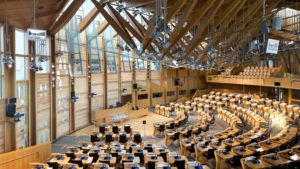Chelsea Rocks
For the last two decades, Scotland has increasingly looked at Holyrood as its governing body, placing trust in the ministers’ ability to shape the legislation, policies and practices which support citizens and support economic security and growth.
That’s all the more so over the last 11 months of the pandemic. But while that has rightly been a priority, more could have been done to acknowledge the growing poverty epidemic stemming from a year of lockdown.
We haven’t had a full picture of what’s happening in Scotland, where failings have stretched beyond fatalities and into the support for children in poverty; elderly people isolated in their homes and businesses crumbling under never ending lockdowns.
There are serious issues to be raised about the localised handling of the coronavirus pandemic and how cuts to local government funding have failed the most vulnerable.
There is clear evidence to suggest similar issues have been taking place in England – you only have to google ‘Andy Burnham’ to understand there are similar frustrations south of the border – it should not be a game of tit for tat or ‘we failed less than them’.
Instead of political point scoring, both Westminster and Holyrood could do more to admit and address where years of misjudging localised issues have failed the people who keep them in power. Or give the decision making powers to the people who do understand local issues.
It is therefore time to reconsider devolution and what more could be achieved by allowing local councils and public bodies more control over their local communities in order to empower people who currently feel disempowered.
In order for devolution to work in practice, local governments must also be given greater opportunities to question the Scottish Government over their spending priorities. Just as local government leaders and Westminster Ministers can be questioned in Holyrood, why shouldn’t Scottish government leaders be asked to go to Glasgow, Edinburgh, Aberdeen and Dundee and publicly account for their decisions too?
While this all sounds very political, in reality those who are most impacted by this are those on the receiving end. For example, children’s charities in one of the most deprived areas of Glasgow lost funding due to local government cuts– leaving Drumchapel without a frontline youth service and award winning organisations on the brink of closure, only to be saved by third sector funding at the eleventh hour.
You only need to look less than five miles beyond Drumchapel to West Dunbartonshire Council, where three additional food banks were required to open and support the distribution of free meals and essentials to families in the wake of the Covid crisis.
It would be unfair to suggest all is dismal in these greater Glasgow communities, as West Dunbartonshire Council have invested tens of millions into the Queens Quay development – taking a new approach to renewable energy in order to power the social housing, health centre and elderly care facility surrounding the tidal energy heating plant.
Projects like this highlight what Scotland can do now to prepare for our future, making the most of our surroundings and our great engineering capabilities to place ourselves as global leaders in Climate Change. What Scotland does not need is more of a power grab from Holyrood – where there appears to be a significant lack of viable accountability. Instead, Westminster should grant further devolution to the Scottish Government on the terms that it will be filtered down to a local level. More financial support and autonomy needs to be given to local councils from Holyrood, to ensure public money is being spent in line with local priorities.
Devolution should enable those who benefit from the system to be given a voice in shaping it. Much the same as Westminster fails to acknowledge those living outside of the SW postcode, the Scottish government could do more to share the powers it has to those beyond the corridors of Holyrood.
In my home city of Glasgow, too many people feel government is done to them, not by them. is it any wonder then that for too many, especially those in our most deprived communities, they feel removed from the decision making process?
We too often treat people like passive recipients – who are supposed to feel grateful for mutely accepting whatever a distant government in Holyrood or Westminster decides to hand down to them from on high. Taking power back to local streets and local communities isn’t some dry exercise in government reform – it’s about trusting and handing back control to people, families and communities who, for decades, have been deemed incapable or unworthy of it.
Devolution would maintain partnership with the rest of the UK to allow for a rational approach to national and international trade as well as the protection of national security, while achieving real change for the people of Scotland.
In 1999, Donald Dewar proclaimed that the Scottish Parliament would “never lose sight of what brought us here: the striving to do right by the people of Scotland; to respect their priorities; to better their lot; and to contribute to the commonweal.”
It appears the Scottish Government has now lost sight of their priorities and it seems more invested in protecting itself than delivering for the commonweal in Scotland. It is now time for those at the grassroots to hold them accountable for their actions.





